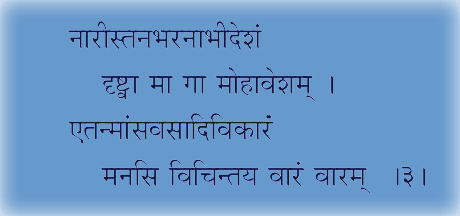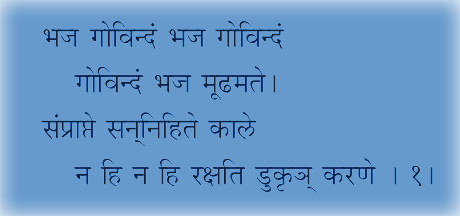
Translation
O Fool, abandon the greed for acquiring wealth. Entertain the thought of Reality in the mind, free from passion. Let the mind be content with whatever wealth you obtain by your own actions.
Interpretation
In this verse, Shankara deals with the first of the twin motivations we spoke of in the introduction to the Bhaja Govindam i.e. kanchanam, acquisition (wealth), which is the negative aspect of human nature i.e. securing oneself from sorrow or dukkha nivrtti in Sanskrit.
Shankara addresses the excessive and inflated value that we have for the world and its offerings. He urges us to renounce the thirsts to possess wealth. Not to renounce the wealth itself. It is that servile mentality towards material objects that Shankara is averse to. So powerful is that trishna (insatiable thirst) that instead of us possessing the object, we become possessed by it. We become servants to the material world when we are designed to be masters of it. To have a slavish attitude towards the material world is to live below the dignity of a human being. And this is what Shankara finds repulsive. It is only our poverty thinking that makes us poor. We may have enough of the world and much more. A nice home, a family, a fancy car… but it is that fiendish trishna for the objects of the world that robs us off our wealth. Hence we must move from poverty thinking to prosperity thinking.
It is important to note that Shankara does not object to possessions themselves but only to the black-market value we place on them.
The solution Shankara places before us are to ‘entertain the thought of Reality’ in our minds ‘free from passion’. This means that we must work towards the goal of Self-realisation free from the distractions of desire. This, however, applies only to those true seekers who want to liberate themselves from the cycle of birth and death to attain moksha. Few of us really want this. Most of us just want a little peace in our lives. Hence what it means to this class of seekers is that they need to channelise our energies in a constructive manner towards the achievement of a higher goal. This is possible only when we have a higher desire.
Now the first question that arises is ‘what is this higher desire?’ Let us take a look.
The most important thing to remember is the BMI pyramid i.e. the pyramid of the body, mind and intellect.
The physical desires or the desires at the level of the body lie at the bottom of this classification of desires. If we have physical desires, we feel happy only when our physical needs are met. The enjoyment comes only when contacting the sense-object. When we move up to the emotional level or the level of the mind, we are able to find joy not only in the fulfillment of our own desires but those of others as well. For example, a hungry parent finds greater joy in feeding one’s child rather than oneself. Above this is the intellectual level. When we are absorbed in intellectual pursuit, we rise above our physical discomforts and the fact that we may be emotionally starved. For example a scientist absorbed in research of a new invention is able to sit in his or her laboratory for hours on end oblivious of what is happening around. The scientist is able to rise above his or her physical and emotional needs to commit himself or herself to the progress of the research. Another example was Mahatma Gandhi. He rose above his physical and emotional needs for the achievement of his goal, independence for India. This is the power of the intellect. At the pinnacle of this BMI pyramid are our spiritual desires. When we are absorbed in spiritual pursuit nothing can affect us. We rise above our physical, emotional and intellectual needs to step into the realm of the Spirit.
As we move higher in the pyramid, not only do the quantum of desires reduce but also the quality gets refined.
At the end of the verse, Shankara says that once we have pursued that higher goal with our heart and soul, we must remain satisfied with what we get as the fruit of action. In this small statement Shankara defines what it is to be rich. It is about being happy with what we have. This does not mean we should be complacent. There must be higher aspirations and a desire to excel. But our happiness should not be pegged on the future. Thus ‘richness’ is not a function of how much one has, it is really a function of how much one wants.
In terms of spiritual pursuit, Shankara says we must be happy with ourselves, be content with what we have achieved but we must never rest on our laurels until we get to that ultimate state of Enlightenment.



